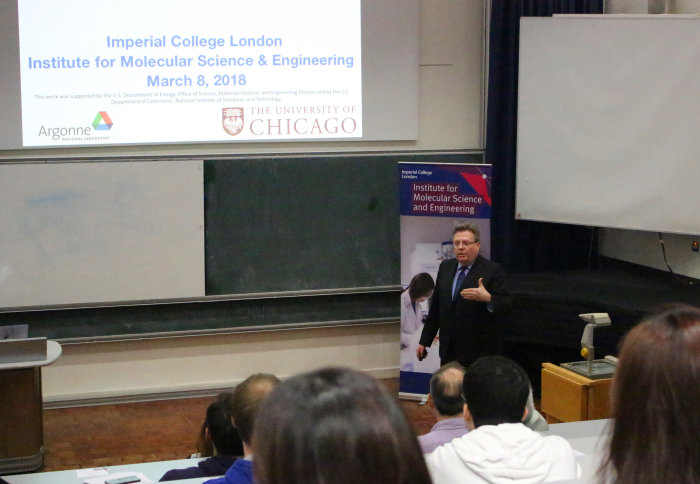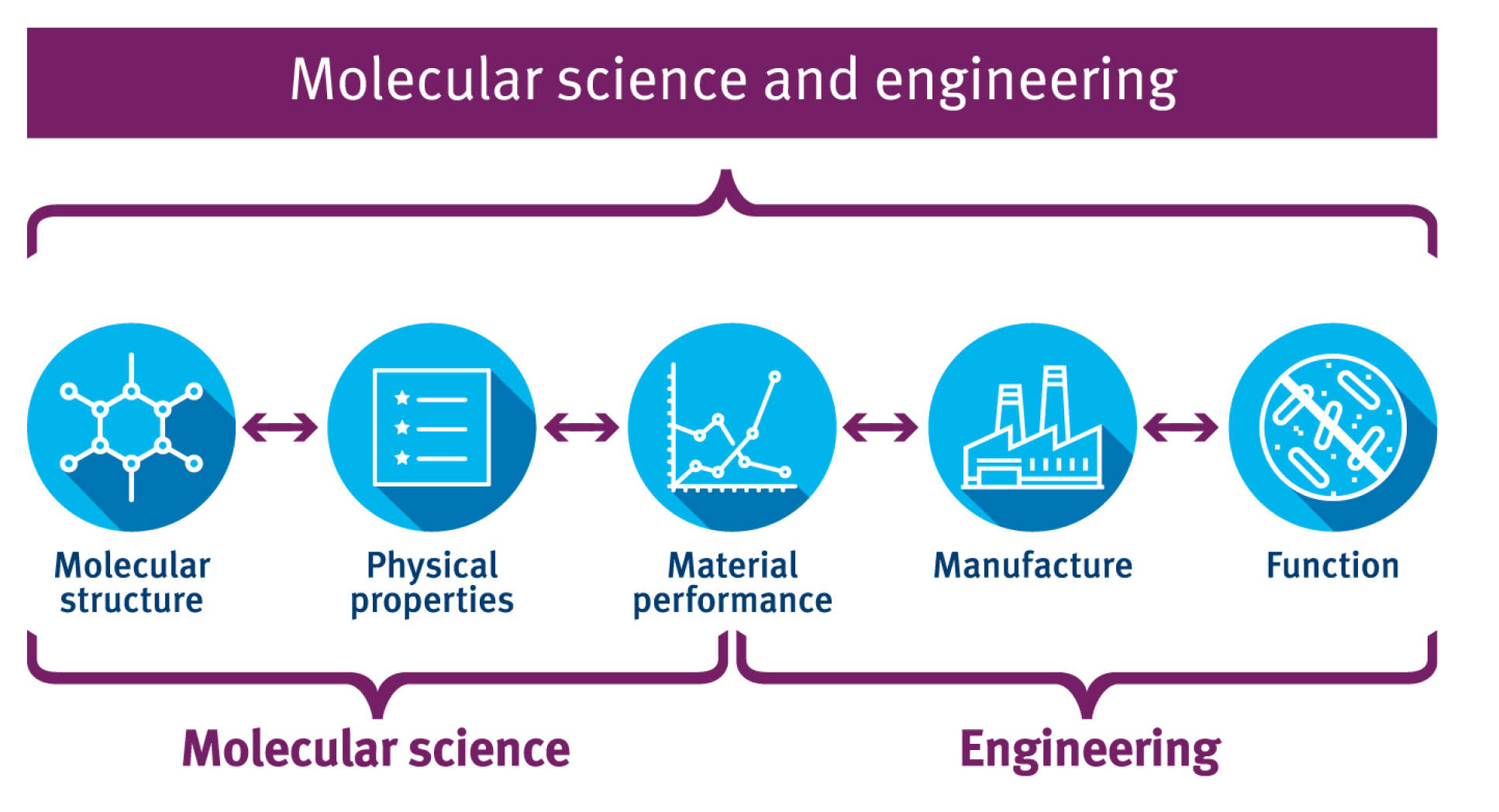Transatlantic collaborations in molecular science and engineering

Professor Matt Tirrell, Director of the Institute for Molecular Engineering, University of Chicago, visited Imperial last week.
I'm very happy to be back at Imperial, five years since my last visit, when both our Institutes were in their infancy. It's fascinating to see the parallel paths they are growing along. Professor Matt Tirrell Pritzker Director, Institute for Molecular Engineering
Professor Tirrell’s visit to the Institute for Molecular Science and Engineering (IMSE) continues the growing relationship between these two ‘sister institutes, both of which are pioneers in the burgeoning molecular science and engineering landscape. IMSE were also privileged to host Professor Juan de Pablo – also from the Institute for Molecular Engineering (IME) – last year.
Molecular science and engineering
In the molecular science and engineering approach, a deep understanding of fundamental science is melded with an engineering mind-set so that the boundaries between traditional academic disciplines are transcended.
This is increasingly being seen as a powerful way to create novel, effective and sustainable solutions to global grand challenges, including the race to realise a viable ‘green’ energy supply and to the tackle the growing threat of antimicrobial resistance.
Furthermore, the molecular science and engineering approach can be used to realise commercially ready materials in an accelerated, flexible and economic manner.
Parallel paths
As part of the growing worldwide molecular science and engineering community, IMSE and IME share similar visions.
IMSE’s overarching aim is to bring Imperial’s engineers, scientists, medics and business researchers together with a wide array of external stakeholders, to find sound scientific and engineering solutions to pressing grand challenge problems.
The newest of Imperial’s six Global Institutes, IMSE’s endeavours are based upon three guiding pillars:
- advancing integrated transdisciplinary research
- transforming education
- enabling effective translation of research to industry.
The challenges that are pursued by the Institute, and its research agenda, are primarily driven by its collection of more than 100 Affiliates (Imperial academics spanning 15 departments and 3 faculties).
IME’s own vision is well aligned with that of IMSE: “to lead engineering research and education in new directions, solve major technological problems of global significance, and continually inspire creative applications of molecular-level science”.
The structure of the two Institutes, however, does differ slightly. Instead of IMSE’s ‘affiliate model’, IME is staffed by a growing world-class faculty, and their associated researchers.
The research conducted at IME is defined by the interests and strengths of the faculty, and currently falls within six themes:
- Arts, Sciences and Technology
- Energy Storage and Harvesting
- Immuno-engineering and Cancer; Water
- Quantum Information and Technology
- Nanopatterning and Nanolithography
Manipulating and measuring polymer surfaces for bio-applications
Professor Tirrell’s own research, and the work he described in his IMSE Highlight Seminar – Polyelectrolytes in multivalent ionic media: new physics and new materials – falls into the IME’s Immuno-engineering and Cancer research theme.

As a leader in the fields of biomolecular engineering and nanotechnology, Professor Tirrell and his research group specialise in the manipulation and measurement of the surface properties of polymers.
Using their expertise, Professor Tirrell’s group can design bespoke polymers to allow controlled assembly of complex molecules, such as micelles and hydrogels. In turn, these complexes can be used as a platform for versatile biomaterials, with potential applications in drug delivery, tissue engineering and diagnostics.
Investing in the future
IMSE and IME also both place a heavy emphasis in the importance of their educational programmes.
IME’s interdisciplinary doctoral programme welcomes students from a range of backgrounds, including those with undergraduate degrees in physics, biology and chemistry. Graduate students are encouraged to collaborate across the faculty and to use their expertise to address pressing real-world issues. Furthermore, IME has been instrumental in launching the first engineering undergraduate programme – in Molecular Engineering – at the University of Chicago.
I find it fascinating that by predicting and controlling matter at the molecular level, we can engineer the best solutions to specific real-world problems at a macroscopic level. Mr Xabier Jimenez Garcia IMSE MRes Student 2017-18
Likewise, IMSE’s one-year Master’s of Research (MRes) in Molecular Science and Engineering is designed to create a new generation of ‘multilingual’ scientists and engineers who can work seamlessly between the traditional academic disciplines. Through a set of taught modules and a six-month industry-focused research project, graduates are uniquely placed to tackle problems of societal and industrial significance.
Applications for this year’s entry to IMSE’s MRes are currently open. The course is particularly relevant to:
- scientists wanting to focus on the practical applications of their research
- engineers wanting to better understand the fundamentals of molecular science
- students wanting to gain practical experience in industry.
IMSE Highlight Seminar Series continues
IMSE’s Highlight Seminar Series continues on Monday 21 May at 14.00, when Professor Frances Arnold from Caltech will deliver a talk titled Innovation by evolution: bringing new chemistry to life. Please RSVP in advance or contact Hannah Barclay for more information.
Article text (excluding photos or graphics) © Imperial College London.
Photos and graphics subject to third party copyright used with permission or © Imperial College London.
Reporter
Dr Shoshana Z Weider
Faculty of Engineering